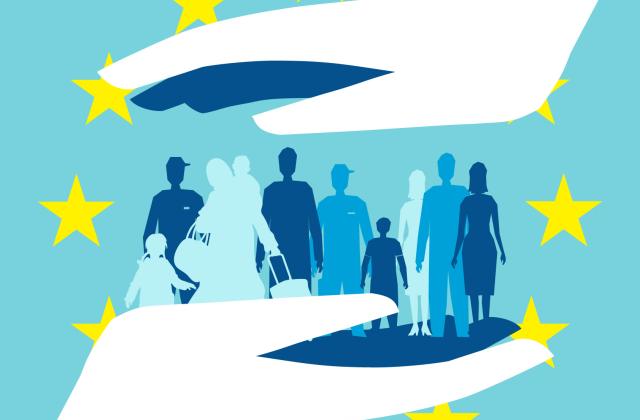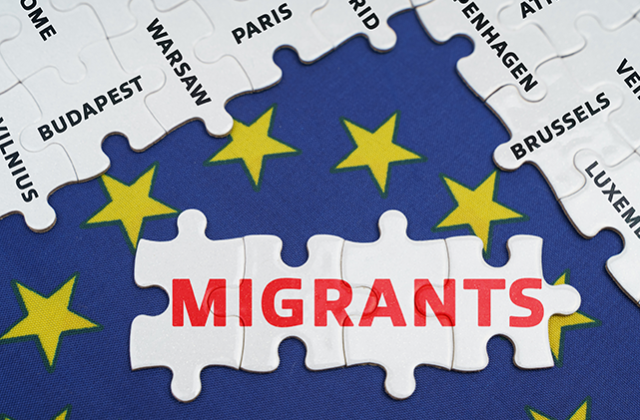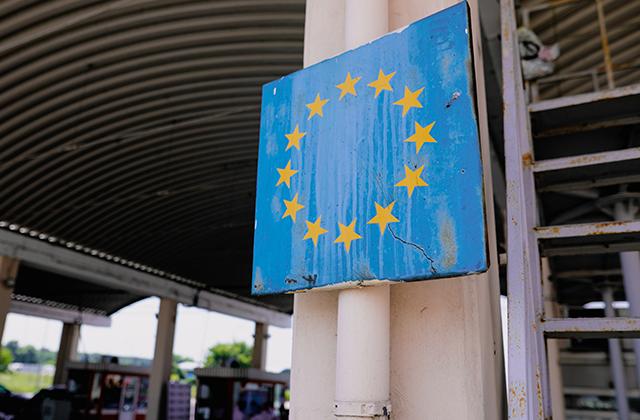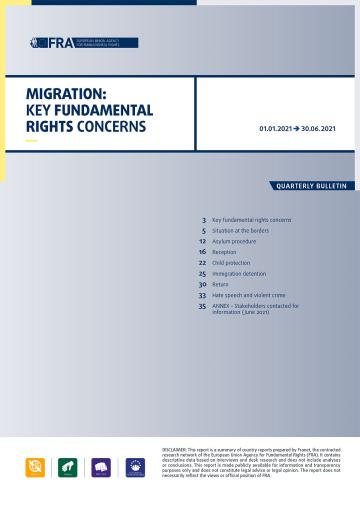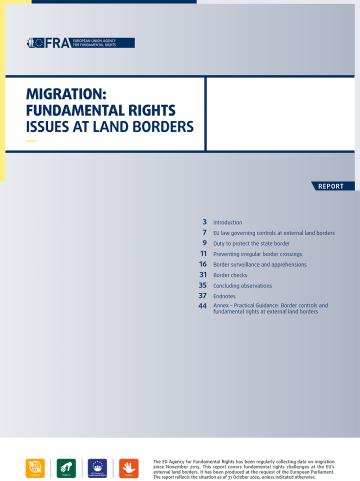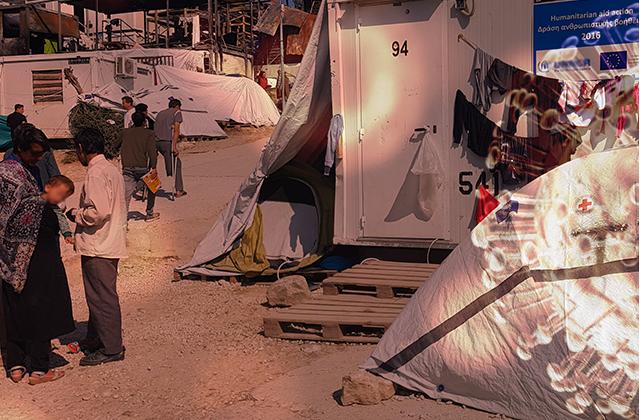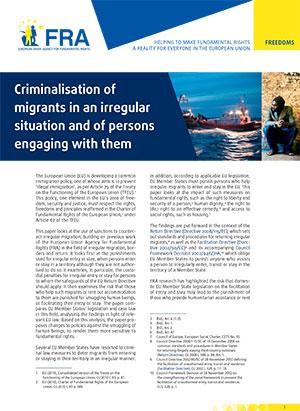- This annex presents four situations at the EU’s external borders, which have been viewed as the instrumentalisation of migrants and refugees, and the key legal and policy actions by the affected Member States. The annex does not cover responses to arrivals which were not triggered by instrumentalisation.
-
In February 2020, Türkiye announced it would no longer prevent migrants from crossing into the EU and, according to testimonies, took measures to facilitate the entry of persons into Greece [128]
Council of Europe, ‘Report to the Greek government on the visit to Greece carried out by the European Committee for the Prevention of Torture and Inhuman or Degrading Treatment or Punishment (CPT) from 13 to 17 March 2020’, CPT/Inf (2020) 35, 19 November 2020, paragraph 6.
. As a result, thousands of people headed towards the Greek–Turkish land border in Kastanies in the Evros River region [129]
According to Greece’s prime minister on 3 March 2020, Greece prevented 24 000 attempts of entry in a few days. See, Mitsotakis, K., ‘Statements by Prime Minister Kyriakos Mitsotakis in Kastanies, Evros, following his visit with the heads of the EU institutions at the Greek–Turkish border’, 3 March 2020.
. Greek border guards responded with summary returns and the use of force [130]
FRA, Migration: Key fundamental rights concerns – Quarterly bulletin 2 – 2020, Publications Office of the European Union, Luxembourg, 2020, p. 15.
. Some allegations – though denied by the authorities [131]
Euronews, ‘Greek government deny Turkish accusations that migrant was shot crossing border’, Euronews website, 4 March 2020.
– refer to the use of live ammunition, which reportedly resulted in the death of two persons and several injuries [132]
See, for example, Amnesty International, ‘Greece/Turkey: Asylum-seekers and migrants killed and abused at borders’, Amnesty International website, 3 April 2020 (reporting on unlawful use of force, killings at the border, push-backs, arbitrary detention and suspension of asylum, physical violence, and confiscation and destruction of migrants’ belongings). See, also, Human Rights Watch, ‘Greece: Violence Against Asylum Seekers at Border – Detained, assaulted, stripped, summarily deported’, Human Rights Watch website, 17 March 2020; Forensic Architecture, ‘The killing of Muhammad Gulzar’, Forensic Architecture website, 8 May 2020; and Forensic Architecture, ‘The killing of Muhammad al Arab’, Forensic Architecture website, 3 July 2020.
. -
In March 2020, Greece suspended the submission of asylum applications for one month for those entering Greece in an irregular manner. The measures adopted provided for the return of newly arrived persons to their country of origin or transit without registering their asylum claim [133]
European Database of Asylum Law, ‘Government Gazette, A’45/02.03.2020’, National legislation of Greece, 2 March 2020.
. The one-month suspension was not extended and asylum applications of those who entered Greece were subsequently registered. Many of those who entered were charged for irregular entry. As an illustration, the judicial authorities in Orestiada sentenced 103 persons to imprisonment [134]
Council of Europe, ‘Report to the Greek government on the visit to Greece carried out by the European Committee for the Prevention of Torture and Inhuman or Degrading Treatment or Punishment (CPT) from 13 to 17 March 2020’, CPT/Inf (2020) 35, 19 November 2020, paragraphs 16–19.
. Criminal procedures concerned men, women and unaccompanied children, and led to the separation of families [135]
FRA, Migration: Fundamental rights issues at land borders, Publications Office of the European Union, Luxembourg, 2020, p. 27.
. - Shortly after the events, the number of arrivals decreased, also due to the COVID-19 pandemic.
-
In 2015, Spain enacted legislation allowing for the immediate return of migrants without individual assessment if detected trying to cross the border into its North African exclaves, Ceuta and Melilla [136]
Spain, Ley Orgánica 4/2015, de 30 de marzo, de protección de la seguridad ciudadana [Organic Law 4/2015 of 30 March on the protection of citizens’ security], 31 March 2015, special provisions on Ceuta and Melilla on pages 27242–27243.
. This provision, referred to as hot returns (devoluciones en caliente), remains in force. FRA commented on its application in several fundamental rights reports, describing the practice of apprehension of migrants by Spanish authorities and the handover to the Moroccan authorities through the gates in the border fence without assessing whether there are bars to removal flowing from the principle of non-refoulement [137]
FRA, Fundamental Rights Report 2016, p. 15; Fundamental Rights Report 2019, pp. 131–132; Fundamental Rights Report 2020, p. 118, Fundamental Rights Report 2021, p. 156; Fundamental Rights Report 2022, p. 145; Fundamental Rights Report 2023, p. 150.
. -
In May 2021, some 8 000 migrants attempted to enter the Spanish town of Ceuta from Morocco. Morocco’s actions were seen as an attempt to pressure Spain after a diplomatic dispute over treating a Western Saharan rebel leader in a Spanish hospital [138]
Reuters, ‘Spain vows to restore order after thousands swim into Ceuta from Morocco’, Reuters website, 19 May 2021 (creation 18 May 2021).
. In response, Spain applied its hot returns provision in the amended Aliens Act [139]
Varo, L. J., ‘La Fiscalía de Ceuta investiga las devoluciones en caliente de menores durante la crisis fronteriza’ ‘[The Ceuta Public Prosecutor’s Office is investigating the hot returns of minors during the border crisis]’, El País website, 28 May 2021; and Rasche, L., ‘The instrumentalisation of migration – How should the EU respond?’ Hertie School Jacques Delors Centre, 16 December 2022.
. It was debated – mainly among academics – whether this incident could be considered as the instrumentalisation of migrants and refugees [140]
See, for example,Cassarino, J. P., ‘An unsettling déjà-vu: The May 2021 Ceuta events’, European Papers, Vol. 7, No 1, 2022, p. 85; Garcés Mascareñas, B., ‘Ceuta: The weaponisation of migration’, Barcelona Centre for International Affairs, May 2021; Ferrer-Gallardo, X. and Gabrielli, L., ‘The fenced offcities of Ceuta and Melilla: Mediterranean nodes of migrant (im)iobility’, in: Zapata-Barrero, R., Awad, I. (eds) Migrations in the Mediterranean, Springer, 2023, pp.289–308; and Goldner Lang, I., ‘Instrumentalisation of migrants: It is necessary to act, but how?’, EU Immigration and Asylum Law and Policy – Blog of the Odysseus Academic Network website, 15 October 2024.
.
-
In 2021, Latvia, Lithuania and Poland saw a sharp increase in unauthorised border crossings by Middle Eastern and African nationals, orchestrated by the Belarusian regime that issued visas and facilitated their travel to the EU external border. As of 16 November 2021, Lithuania recorded 4 222 such unauthorised crossings from Belarus, Poland recorded 3 062 and Latvia recorded 414. These may include multiple attempts to cross by the same individuals. The three Member States registered 9 985 asylum applications and prevented 42 741 attempts to cross the EU’s external border by circumventing border controls as of 21 November 2021 [141]
Proposal for a Council Decision on provisional emergency measures for the benefit of Latvia, Lithuania and Poland, COM(2021) 752 final of 1 December 2021, p. 2; FRA, Migration: Key fundamental rights concerns – Quarterly bulletin 1 – 2022, Publications Office of the European Union, Luxembourg, 2022, p. 10.
. -
All three Member States declared states of emergency in 2021 [142]
Latvia, Par ārkārtējās situācijas izsludināšanu [On the declaration of a state of emergency], Government Decree No 518, 10 August 2021; Latvian Public Media, ‘UNHCR “closely following” border situation in Latvia’, Latvian Public Media website, 13 August 2021; Lithuania, Seimas Resolution No XIV‑617 of9 November 2021 on the introduction of a state of emergency and Seimas Resolution No XIV-932 of 10 March 2022 for the exceptions; and Poland, Rozporządzenie Prezydenta Rzeczypospolitej Polskiej z dnia 2 września 2021 r. w sprawie wprowadzenia stanu wyjątkowego [Presidential Regulation of 2 September 2021 on the introduction of a state of emergency in part of the Podlaskie Voivodeship and part of the Lublin Voivodeship], Journal of Laws 2021, item 1612, 2 September 2021.
, refusing to register asylum requests of people intercepted at the green border, except for narrow humanitarian exceptions. Access to certain border areas became restricted [143]
Latvia, Par ārkārtējās situācijas izsludināšanu [On the declaration of a state of emergency], Government Decree No 518, 10 August 2021; Latvia, Par pastiprināta robežapsardzības sistēmas darbības režīma izsludināšanu [On the declaration of an enhanced border‑protection regime], Ministers’ Order No 184, 12 March 2024; Latvijas Republikas Valsts Robežsardze [State Border Guard of the Republic of Latvia],‘Valdība pagarina pastiprinātu robežapsardzības režīmu līdz nākamā gada 30. jūnijam’, State Border Guard of the Republic of Latvia website,18 December 2024; Lithuania, Sprendimas dėl masinio užsieniečių antplūdžio pasienio ruožo teritorijose prie Lietuvos Respublikos valstybės sienos su Baltarusijos Respublika valdymo ir valstybės sienos apsaugos sustiprinimo [Ministerial Decision on themassive influx of foreigners in the territories of the bordersection at the stateborder of the Republic of Lithuania with the Republic of Belarus and the strengthening of the state border protection], Ministers’ Decision No 10V-20, 2 August 2021; Lithuania, Lietuvos Respublikos valstybės sienos ir jos apsaugos įstatymas Nr. VIII-1666 [Law No VIII-1666 on the state border and its protection], 9 May 2000, latest amendment No XIV-1891, 25 April 2023; Lithuania, Sprendimas dėl masinio užsieniečių antplūdžio pasienio ruožo teritorijose prie lietuvos respublikos valstybės sienos su baltarusijos respublika valdymo ir valstybės sienos apsaugos sustiprinimo [Ministerial Decision on the management of the mass influx of aliens in the border areas along the state border of the Republic of Lithuania with the Republic of Belarus and the strengthening of state border protection], 2 August 2021; and Poland, Dz.U. 2021 poz. 1918 [Act of 14 Oct 2021] inserts Article 303b in the Foreigners Act (on-the-spot ‘leave Poland’ order) and Council Regulation of 27 March 2025 (Dz.U. 2025 poz. 390) temporarily suspends acceptance of asylum claims at the Belarus border, except for a short list of persons with vulnerabilities.
. FRA noted in its 2024 fundamental rights report that safeguards to uphold the right to asylum – such as humanitarian or refoulement-related exceptions – were weak [144]
Latvia, Valsts robežsardzes likums [State Border Guard Law], Article 15(1), subparagraph 51; Lithuania, Lietuvos Respublikos valstybės sienos ir jos apsaugos įstatymas Nr. VIII-1666 [Law No VIII-1666 on the state border and its protection], 9 May 2000, latest amendment No XIV-1891, 25 April 2023, Article 4(13); and Poland, Ustawa z dnia 14 października 2021 r. o zmianie ustawy o cudzoziemcach oraz niektórych innych ustaw [Law 1918/2021 amending the Act on Foreigners and other acts], Dz.U. 2021 poz. 1918, Article 3.
. -
Latvia’s measures, repeatedly prolonged, now run to 31 December 2025 [145]
Latvia, Par pastiprināta robežapsardzības sistēmas darbības režīma izsludināšanu [On the declaration of an enhanced border‑protection regime], Ministers’ Order No 184,12 March 2024 as amended on 26 June 2025 by Cabinet Order No 376; and Latvijas Republikas Valsts Robežsardze [State Border Guard of the Republic of Latvia], ‘Valdība pagarina pastiprinātu robežapsardzības režīmu līdz nākamā gada 30. jūnijam’, State Border Guard of the Republic of Latvia website,18 December 2024.
. Lithuania continues to operate under a July 2021 ‘state-level emergency’ [146]
Lithuania, Nutarimas dėl valstybės lygio ekstremaliosios situacijos paskelbimo ir valstybės lygio ekstremaliosios situacijos operacijų vadovo paskyrimo [Government Decision on the declaration of a state‑level emergency and the appointment of a state‑level emergency operations manager], No 517, 2 July 2021.
. Poland reverted to ordinary law, enacting legal changes that allow the suspension of the right to asylum due to the instrumentalisation of migrants at the state border for up to 60 days [147]
Poland, legal basis for the suspension: Ustawa z dnia 21 lutego 2025 r. o zmianie ustawy o udzielaniu cudzoziemcom ochrony na terytorium Rzeczypospolitej Polskiej [Act of 21 February 2025 amending the Act on Granting Protection to Foreigners within the Territory of the Republic of Poland]; instrument that triggers the suspension: Rozporządzenie Rady Ministrów z dnia 27 marca 2025 r. w sprawie czasowego ograniczenia prawa do złożenia wniosku o udzielenie ochrony międzynarodowej [Regulation of the Council of Ministers of 27 March 2025 on the temporary restriction on lodging applications for international protection]; and its latest extension of 26 May 2025 Rozporządzenie Rady Ministrów z dnia 23 maja 2025 r. w sprawie przedłużenia czasowego ograniczenia prawa do złożenia wniosku o udzielenie ochrony międzynarodowej, [Regulation of the Council of Ministers of 23 May 2025 on the extension of the temporary limitation of the right to submit an application for international protection].
, but also still applies a 2020 COVID-19 regulation [148]
Poland, Rozporządzenie Ministra Spraw Wewnętrznych i Administracji z dnia 13 marca 2020 r. w sprawie czasowego zawieszenia lub ograniczenia ruchu granicznego na określonych przejściach granicznych [Regulation of the Minister of the Interior and Administration of 13 March 2020 on the temporary suspension or restriction of border traffic at certain border crossing points] (Dz.U. 2020 poz. 435, as repeatedly amended).
and 2021 rules allowing summary returns to Belarus of people apprehended after their irregular crossing [149]
Poland, Poz. 1536 Rozporządzenie zmieniające rozporządzenie w sprawie czasowego zawieszenia lub ograniczenia ruchu granicznego na określonych przejściach granicznych [Amendment to the regulation on the temporary suspension or restriction of border traffic at certain border crossing points], 20 August 2021.
. -
The CJEU found Lithuania’s legislation [150]
Lithuania, Lietuvos Respublikos įstatymas ‘Dėl užsieniečių teisinės padėties [Law of the Republic of Lithuania on the legal status of aliens], Article 14012(2).
banning asylum applications by third-country nationals who had crossed the border in an unauthorised manner and their automatic detention to be in breach of EU law [151]
Judgment of the Court of Justice of 22 June 2023, M.A. v Valstybės sienos apsaugos tarnyba, C-72/22, ECLI:EU:C:2022:505.
. While Lithuania changed the Aliens Act [152]
Lithuania, „Dėl užsieniečių teisinės padėties“ Nr. IX-2206 4, 67, 1408, 14012 straipsnių pakeitimo ir 14011, 14017 straipsnių pripažinimo netekusiais galios įstatymas 2023 m. balandžio 20 d. Nr. XIV-1889 [Law on the Amendment of Articles 4, 67, 140-8, 140-12 of the Law of the Republic of Lithuania ‘On the Legal Status of Foreigners’ No IX-2206], 20 April 2023.
, a clause that facilitates the ‘re-direction’ to the border in the law on the state border remains in force, though there are exceptions for humanitarian reasons [153]
Lithuania, Lietuvos Respublikos valstybės sienos ir jos apsaugos įstatymas Nr. VIII-1666 [Law No VIII-1666 on the state border and its protection], 9 May 2000, latest amendment No XIV-1891, 25 April 2023, Article 4(13).
. In sum, Latvian [154]
Latvia, Par ārkārtējās situācijas izsludināšanu [On the declaration of a state of emergency], Government Decree No 518, 10 August 2021; and following that, Latvia, Par pastiprināta robežapsardzības sistēmas darbības režīma izsludināšanu [On the declaration of an enhanced border‑protection regime], Ministers’ Order No 184, 12 March 2024.
, Lithuanian [155]
Lithuania, Lietuvos Respublikos valstybės sienos ir jos apsaugos įstatymas Nr. VIII-1666 [Law No VIII-1666 on the state border and its protection], 9 May 2000, latest amendment No XIV-1891, 25 April 2023.
and Polish [156]
Poland, Poz. 1536 Rozporządzenie zmieniające rozporządzenie w sprawie czasowego zawieszenia lub ograniczenia ruchu granicznego na określonych przejściach granicznych [Regulation No 1536 amending the regulation on the temporary suspension or limitation of border traffic at certain border crossings points], 20 August 2021.
laws allow border guards to escort intercepted migrants having crossed the border irregularly back to Belarus, although legislation envisages some limited checks for non-refoulement risks. Courts in Poland have overturned some of these removals [157]
Poland, Naczelny Sąd Administracyjny [Supreme Administrative Court], judgment of 10 May 2023, No II OSK 1735/22 (II OSK 1735/22) (repealing a return to Belarus); Poland, Wojewódzki Sąd Administracyjny w Białymstoku [Provincial Administrative Court in Białystok], judgment of 30 May 2023, No II SA/Bk 244/23 (II SA/Bk 244/23); and Poland, Wojewódzki Sąd Administracyjny w Białymstoku [Provincial Administrative Court in Białystok], judgment of 13 April 2023, No II SA/Bk 145/23 (II SA/Bk 145/23).
. Three cases against Latvia, Lithuania and Poland concerning alleged unlawful summary returns are pending before the Grand Chamber of the ECtHR, alleging breaches of Articles 2, 3 and 13 of the ECHR and Article 4 of Protocol No 4 to the ECHR [158]
Relinquishment in favour of the Grand Chamber of the ECtHR of 25 June 2024, R.A. and Others v Poland, No 42120/21; relinquishment in favour of the Grand Chamber of the ECtHR of 2 July 2024, H.M.M. and Others v Latvia, No 42165/21; and relinquishment in favour of the Grand Chamber of the ECtHR of 16 April 2024, C.O.C.G. and Others v Lithuania, No 17764/22.
. The three cases are among over 30 such cases pending before the ECtHR against Latvia, Lithuania and Poland [159]
ECtHR, ‘Grand Chamber hearing concerning alleged ‘pushbacks’ at the Polish–Belarusian border’, ECtHR website, 12 February 2025.
. -
Migrants and asylum applicants intercepted at the Belarus border were reportedly exposed to excessive use of force, ill-treatment and abandonment in the forest and swamps without food and protection, according to UN, Council of Europe and civil-society sources [160]
European Committee for the Prevention of Torture and Inhuman or Degrading Treatment or Punishment (CPT), ‘Report to the Latvian Government on the periodic visit to Latvia carried out by the European Committee for the Prevention of Torture and Inhuman or Degrading Treatment or Punishment (CPT) from 10 to 20 May 2022’, CPT/Inf (2023) 16, 11 July 2023, paragraphs 14 and 33; for further sources see FRA, Fundamental Rights Report 2024, Publications Office of the European Union, Luxembourg, 2024, p. 97; UNHCR, ‘Submission by the Office of the United Nations High Commissioner for Refugees in the case of C.O.C.G. and Others v. Lithuania (Application No. 17764/22) before the Grand Chamber of the European Court of Human Rights’, Refworld website, 30 September 2024; Council of Europe, Commissioner for Human Rights, ‘Poland needs to respect its international human rights obligations on the Belarusian border, says Commissioner O’Flaherty’, Council of Europe website, 23 September 2024; and Poland, Commissioner for Human Rights, ‘Skargi migrantów zawróconych do linii granicy. Opinia RPO dla Europejskiego Trybunału Praw Człowieka’, ‘[Complaints by migrants returned to the border line. Opinion of the Commissioner for Human Rights for the ECtHR]’, Biuletyn Informacji Publicznej RPO website, 26 October 2023.
. At the same time, procedures exist requiring border guards to assess individual needs, offer medical aid and observe safeguards like non-refoulement and child protection. -
Latvia [161]
Latvia, Latvijas Republikas valsts robežas likums [Law on the State Border of the Republic of Latvia], 12 November 2009, Section 18.
maintained, whereas Lithuania [162]
Lithuania, Seimas Resolution No XIV-617 of 9 November 2021 on the introduction of a state of emergency, Article 2(2).
and Poland [163]
Poland, latest extension of 3 June 2025 ‘Rozporządzenie Ministra Spraw Wewnętrznych i Administracji z dnia 3 czerwca 2025 r. w sprawie wprowadzenia czasowego zakazu przebywania na określonym obszarze w strefie nadgranicznej przyległej do granicy państwowej z Republiką Białorusi’ ‘[Regulation of the Minister of the Interior and Administration of 3 June 2025 on the introduction of a temporary ban on staying in a designated area of the border zone adjacent to the state border with the Republic of Belarus]’, 3 June 2025; see also European Council on Refugees and Exiles, ‘POLAND: New report highlights abuse against people trying to cross Poland–Belarus border – Three month extension for border “exclusion zone” – Controversial asylum law approved– Government restates opposition to EU Migration Pact despite legal threat’, European Council on Refugees and Exiles website, 20 March 2025.
introduced, ‘no-go’ border strips that prevent without prior permission non-governmental organisations, journalists and humanitarian workers from reaching people stranded in border forests. Only for a limited number of people, such as national ombudspersons, does the law not envisage any restrictions to monitor the border area. -
All three Member States restricted traffic at the border crossing points with Belarus [164]
Latvia, Par prasības noteikšanu ieceļošanai tikai ar mehāniskajiem transportlīdzekļiem robežšķērsošanas vietās ‘Pāternieki’, ‘Terehova’ un ‘Grebņeva’, Cabinet Order No 166, 19 March 2025; Ministry of the Interior of the Republic of Lithuania, ‘The operation of the Lavoriškės and Raigardas border crossing points will be terminated from 1 March’, Ministry of the Interior of the Republic of Lithuania website, 6 September 2024 (created 22 February 2024); Poland, Informacje dla podróżujących [Polish government travel information], accessed on 3 July 2025.
. -
Poland’s July 2024 ‘Homeland Defence Act’ broadens soldiers’ and police officers’ rights to use firearms at the border [165]
Poland, Ustawa z dnia 29 lipca 2024 r. o zmianie ustawy – Ustawa o obronie Ojczyzny oraz niektórych innych ustaw [Act of 29 July 2024 amending the Act on the Defence of the Homeland and certain other acts], Dz.U. 2024 poz. 1377.
.
-
In late 2023, Finland saw a sudden rise in arrivals from Somalia, Syria and Yemen via Russia, with suspicions that Russian authorities were facilitating access to the Finnish border. While small compared to Poland and Lithuania, the number of irregular crossings rose from single digits to hundreds per week [166]
Gera, V. and Tanner, J., ‘Why Finland is blaming Russia for a sudden influx of migrants on its eastern border’, Associated Press website,25 November 2023.
. -
In response, Finland closed most and subsequently all land border crossing points with Russia by the end of 2023 [167]
Finland, Valtioneuvoston päätös SM/2023/4 [Government Decision SM/2023/4], 16 November 2023 (temporary closure of four land border crossing points); Finland, Valtioneuvoston päätös SM/2023/9 [Government Decision SM/2023/9], 22 November 2023 (temporary closure of all border crossing points, except one in Lapland); Finland, Valtioneuvoston päätös SM/2023/15 [Government Decision SM/2023/15], 28 November 2023 (temporary closure of all border crossing points until 13 December 2023); Finland, Valtioneuvoston päätös SM/2023/24 [Government Decision SM/2023/24], 12 December 2023 (temporary closure of all border crossing points, except one in south-eastern and one in eastern Finland); and Finland, Valtioneuvoston päätös SM/2023/27 [Government Decision SM/2023/27], 14 December 2023 (temporary closure of all border crossing points until 14 January 2024). For an official analysis of these measures’ impact on fundamental rights, see Ministry of the Interior, Valtioneuvoston päätös rajanylityspaikkojen väliaikaisesta sulkemisesta ja kansainvälisen suojelun hakemisen keskittämisestä [Government Decision on the temporary closure of border crossing points and centralising the application for international protection], 28 November 2023, containing the views of the Chancellor of Justice.
. After this action, the number of asylum applicants at the Finnish land border dropped significantly. Incidents of ill-treatment have not been reported from the Finnish border. -
Finland enacted the Act on Temporary Measures to Combat Instrumentalised Migration, commonly known as the Border Security Act, which came into force in July 2024, for a one-year period [168]
Finland, Laki väliaikaisista toimenpiteistä välineellistetyn maahanmuuton torjumiseksi [Act on Temporary Measures to Combat Instrumentalised Migration] (‘Border Security Act’), 13 June 2024, Finlex number 407/2024.
. It empowers the government to restrict the reception of asylum applications, except for certain vulnerable individuals, at specific border areas if there is a justified suspicion that a foreign state is attempting to influence Finland in a way that poses a serious threat to national security [169]
Finland, Hallituksen esitys eduskunnalle laiksi väliaikaisista toimenpiteistä välineellistetyn maahantulon torjumiseksi annetun lain 7 §:n muuttamisesta [Government proposal to Parliament for an act amending section 7 of the Act on Temporary Measures to Prevent Instrumental Entry], Hallituksen esitys SM/2025/20 [Government Proposal SM/2025/20], HE 18/2025 vp, 27 March 2025.
. So far, the Border Security Act, which was initially valid for one year, has not been activated. On 4 June 2025, the Parliament approved the extension of the validity of the Border Security Act until the end of 2026 [170]
Finnish Parliament, ‘Parliament approved Border Security Act by 168–29 vote’, Finnish Parliament website, 4 June 2025.
.





